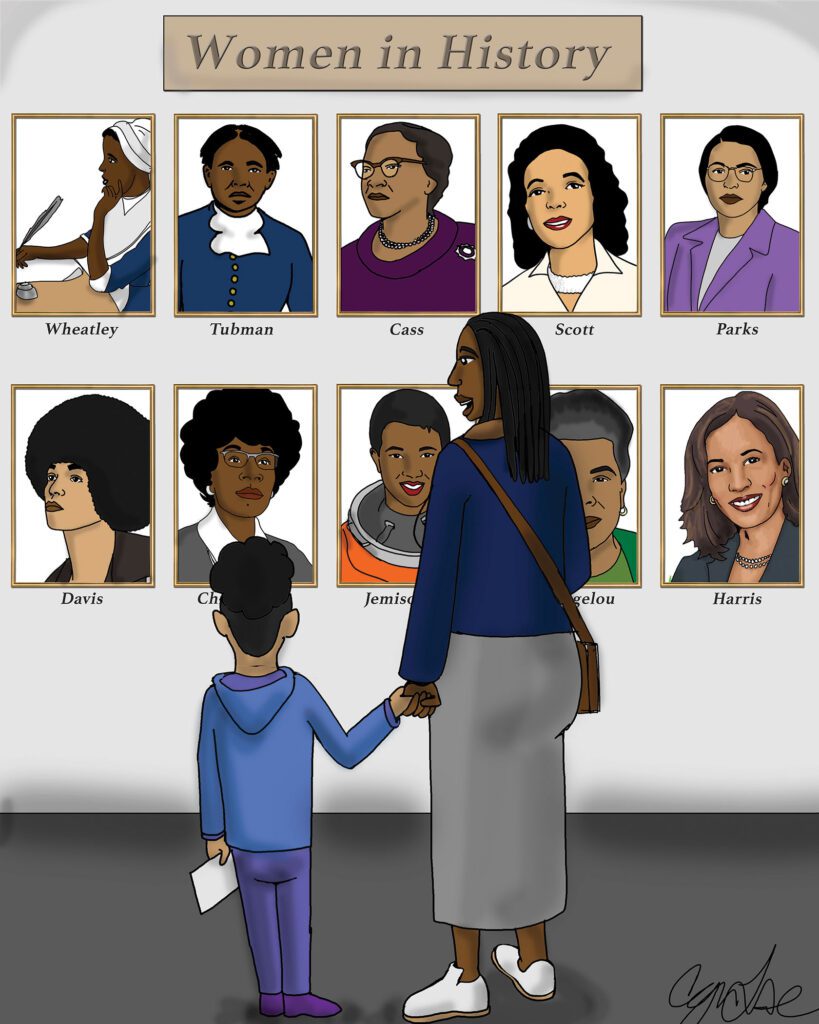
The often-overlooked contributions of women to our history have been celebrated every March since 1987, when Congress created Women’s History Month to replace Women’s History Week, proclaimed by President Jimmy Carter in 1980. It should come as little surprise that the first national recognition came from a Washington outsider with a history of strong women in his family, starting with his mother Lillian, a civil rights activist who defied deep-seated traditions in rural Georgia to advance equal justice, and his late wife Rosalynn, his most-trusted political adviser.
My own mother, Muriel Stark, came to Boston from the West Indies at age 21, found a job in retail, married, and raised our family. She believed deeply in education and put us through private schools and college, and even became one of the first Black trustees of Brimmer and May School. The story of this upwardly mobile Barbadian immigrant, who lived as a proud U.S. citizen for over 70 years, is not written in the history books, but she made history in her own way, negotiating the racial land mines of American society to become one of the first Black homeowners in Chestnut Hill.
We all have women in our families to admire, women who inspired and nurtured us. Then there are social trailblazers from Rosa Parks, who sparked the Montgomery bus boycott by refusing to be treated as a second-class citizen and give up her seat to a white passenger, to Vice President Kamala Harris, the former California attorney general and U.S. senator and the first woman to serve a heartbeat away from the presidency.
Further back in history, Black women from Boston have set impressive standards of achievement. Like Rebecca Lee Crumpler, who in 1864 became the first African American woman in the U.S. to earn a medical degree. Or Josephine St. Pierre Ruffin, who founded and edited The Women’s Era in 1886, the country’s first newspaper published by and for Black women. Ruffin organized the National Federation of Afro-American Women in 1895 and was instrumental in founding the NAACP in 1910.
More currently, for the first time in Fortune 500 history, 10% of its listed companies are run by women. We should be justly proud of Maura Healey as the first elected woman governor of the Commonwealth. And there are presently six Black women leading higher education institutions in New England.
However, women’s rights across the country and world are being challenged — but not without a fight. The Dobbs decision of 2022 overturned the Roe v. Wade decision by the U.S. Supreme Court that protected access to abortion/health care, and sent the policies back to individual states. Many states have in turn effectively banned the procedure after six weeks — a time when many women don’t even know they are pregnant.
The fight for bodily autonomy took another step backward when the state of Alabama’s Supreme Court ruled that embryos created through in vitro fertilization should be considered children. That prompted Kay Ivey, the Yellowhammer State governor, to sign a bill protecting the procedure after many clinics halted work on IVF services, creating a nationwide backlash. Women in certain red states have not been deterred by the SCOTUS ruling and are fighting back to protect their rights. Ohio voters approved a ballot measure reinstating abortion protections in the state Constitution, effectively repealing the state’s six-week ban, and wins by Democrats in Pennsylvania and Kentucky — yes, Kentucky — showed that women continue to use the ballot box to prevent the erosion of their rights.
At the forefront of continuing challenges is the lagging pay gap for women, especially for women or color. According to the American Civil Liberties Union, Black women earn only 64 cents for each dollar earned by white men — and Latina women earn only 54 cents. Closing that gap is long overdue.
More than 50 years have now gone by since the passage of Title IX that prohibits sex-based discrimination in any school or any other education program that receives federal funding. The consequent growth of women’s collegiate athletic programs is now reaping dividends in rising television ratings for women’s sports, especially basketball, and the creation of viable women’s professional leagues.
In 2023, the women’s Final Four basketball telecast averaged 4.5 million viewers on ESPN and the championship game secured a record audience of 9.9 million on ABC. Women’s World Cup soccer audiences and revenues have expanded as well. In 2019, FIFA, the world’s governing body for soccer, generated $766 million in total revenue during that year’s Women’s World Cup, up 41% from the $544 million it generated during the previous Women’s World Cup year in 2015.
As Women’s History Month comes to a close, there are many achievements and much progress to celebrate. But make no mistake. There are forces that seek to deny women’s advancements in the workplace and wrest away hard-won victories in women’s rights to choose. Women’s rights are civil rights. We must protect what has been won and seek further progress in achieving full parity for women.






